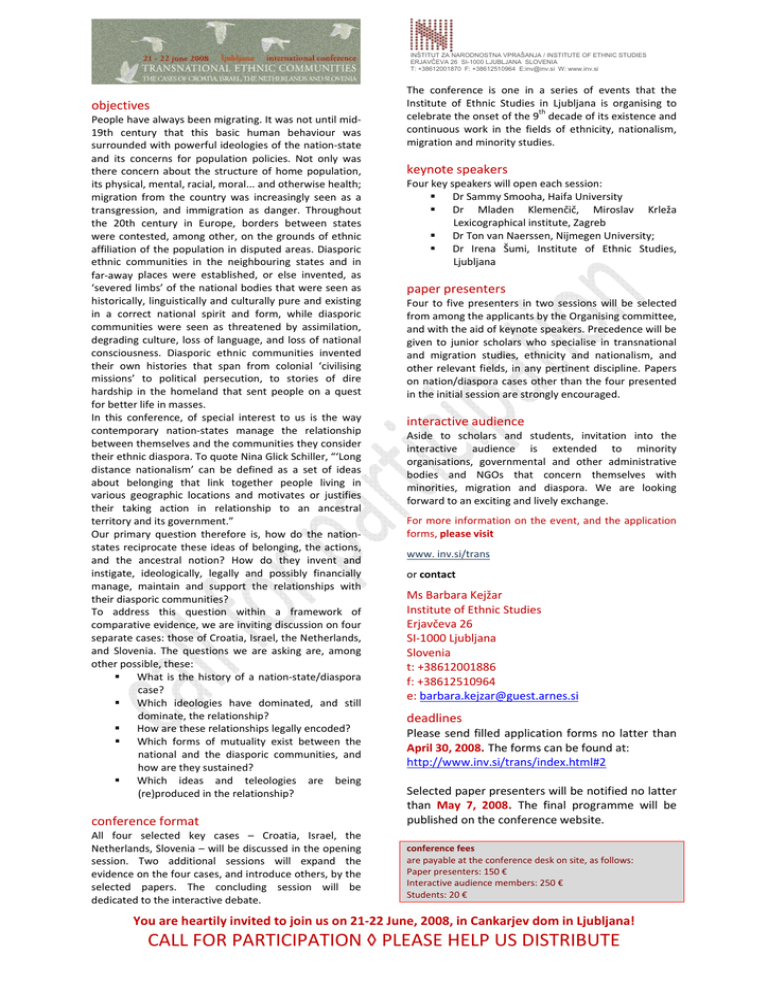Conference flyer - Inštitut za narodnostna vprašanja
advertisement

INŠTITUT ZA NARODNOSTNA VPRAŠANJA / INSTITUTE OF ETHNIC STUDIES ERJAVČEVA 26 SI-1000 LJUBLJANA SLOVENIA T: +38612001870 F: +38612510964 E:inv@inv.si W: www.inv.si objectives People have always been migrating. It was not until mid‐ 19th century that this basic human behaviour was surrounded with powerful ideologies of the nation‐state and its concerns for population policies. Not only was there concern about the structure of home population, its physical, mental, racial, moral... and otherwise health; migration from the country was increasingly seen as a transgression, and immigration as danger. Throughout the 20th century in Europe, borders between states were contested, among other, on the grounds of ethnic affiliation of the population in disputed areas. Diasporic ethnic communities in the neighbouring states and in far‐away places were established, or else invented, as ‘severed limbs’ of the national bodies that were seen as historically, linguistically and culturally pure and existing in a correct national spirit and form, while diasporic communities were seen as threatened by assimilation, degrading culture, loss of language, and loss of national consciousness. Diasporic ethnic communities invented their own histories that span from colonial ‘civilising missions’ to political persecution, to stories of dire hardship in the homeland that sent people on a quest for better life in masses. In this conference, of special interest to us is the way contemporary nation‐states manage the relationship between themselves and the communities they consider their ethnic diaspora. To quote Nina Glick Schiller, “‘Long distance nationalism’ can be defined as a set of ideas about belonging that link together people living in various geographic locations and motivates or justifies their taking action in relationship to an ancestral territory and its government.” Our primary question therefore is, how do the nation‐ states reciprocate these ideas of belonging, the actions, and the ancestral notion? How do they invent and instigate, ideologically, legally and possibly financially manage, maintain and support the relationships with their diasporic communities? To address this question within a framework of comparative evidence, we are inviting discussion on four separate cases: those of Croatia, Israel, the Netherlands, and Slovenia. The questions we are asking are, among other possible, these: What is the history of a nation‐state/diaspora case? Which ideologies have dominated, and still dominate, the relationship? How are these relationships legally encoded? Which forms of mutuality exist between the national and the diasporic communities, and how are they sustained? Which ideas and teleologies are being (re)produced in the relationship? conference format All four selected key cases – Croatia, Israel, the Netherlands, Slovenia – will be discussed in the opening session. Two additional sessions will expand the evidence on the four cases, and introduce others, by the selected papers. The concluding session will be dedicated to the interactive debate. The conference is one in a series of events that the Institute of Ethnic Studies in Ljubljana is organising to th celebrate the onset of the 9 decade of its existence and continuous work in the fields of ethnicity, nationalism, migration and minority studies. keynote speakers Four key speakers will open each session: Dr Sammy Smooha, Haifa University Dr Mladen Klemenčič, Miroslav Krleža Lexicographical institute, Zagreb Dr Ton van Naerssen, Nijmegen University; Dr Irena Šumi, Institute of Ethnic Studies, Ljubljana paper presenters Four to five presenters in two sessions will be selected from among the applicants by the Organising committee, and with the aid of keynote speakers. Precedence will be given to junior scholars who specialise in transnational and migration studies, ethnicity and nationalism, and other relevant fields, in any pertinent discipline. Papers on nation/diaspora cases other than the four presented in the initial session are strongly encouraged. interactive audience Aside to scholars and students, invitation into the interactive audience is extended to minority organisations, governmental and other administrative bodies and NGOs that concern themselves with minorities, migration and diaspora. We are looking forward to an exciting and lively exchange. For more information on the event, and the application forms, please visit www. inv.si/trans or contact Ms Barbara Kejžar Institute of Ethnic Studies Erjavčeva 26 SI‐1000 Ljubljana Slovenia t: +38612001886 f: +38612510964 e: barbara.kejzar@guest.arnes.si deadlines Please send filled application forms no latter than April 30, 2008. The forms can be found at: http://www.inv.si/trans/index.html#2 Selected paper presenters will be notified no latter than May 7, 2008. The final programme will be published on the conference website. conference fees are payable at the conference desk on site, as follows: Paper presenters: 150 € Interactive audience members: 250 € Students: 20 € You are heartily invited to join us on 21‐22 June, 2008, in Cankarjev dom in Ljubljana! CALL FOR PARTICIPATION ◊ PLEASE HELP US DISTRIBUTE


